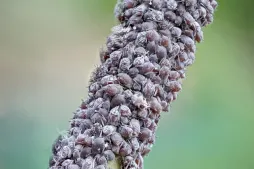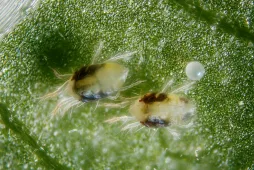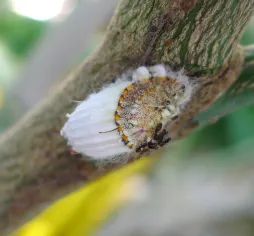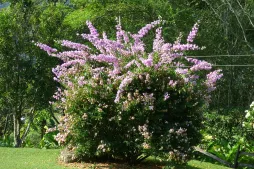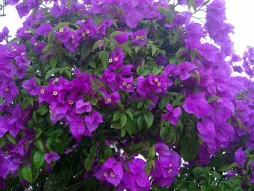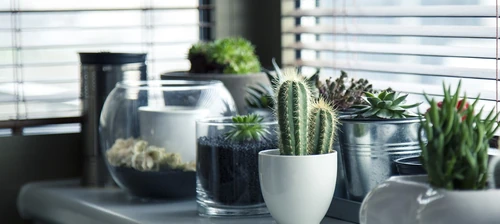Bougainvilliea spectabilis, a bougainvillea that knows how to get noticed
Often planted in front of the white facades of Greek islands, the remarkable bougainvillea (Bougainvillea spectabilis) is actually native to Brazil. This shrub from the Nyctaginaceae family was named in honor of French explorer Louis Antoine de Bougainville. It was under his direction that the first specimens were brought back to France
How to recognize the remarkable bougainvillea, Bougainvillea spectabilis?
The remarkable bougainvillea is a shrub with a climbing habit. In tropical climates, it can reach heights of up to ten meters. In pots and temperate zones, it grows to no more than four meters in all directions.
The sarmentose, thorny stem clings to its support with hooked prickles.
In its natural environment, the remarkable bougainvillea does not lose its foliage. But in less clement climes, it's not uncommon to see the limbs fall off in winter and grow back in the summer. The elliptical leaves have a narrow base and a pointed tip. At their widest, they measure ten centimetres. Dark green, they are covered with down on both sides.
Flowering lasts from spring to autumn. Tubular flowers, in groups of three, bloom on the twigs. Rather insignificant, they are surrounded by three colorful bracts. They're what make this shrub worth seeing! Triangular and tissue-paper-thin, they take on strong hues, ranging from violet to red, white, yellow and pink. Bougainvillea spectabilis, usually crossed with bougainvillea glabra, has given rise to numerous cultivars, including Bougainvillea Elisabeth Angus and bougainvillea Violet de Mèze.
Faded flowers turn into pods. The fruit contains a brown seed that gives rise to other trees.
Bougainvillea spectabilis is non-toxic. Some even claim it has medicinal properties. However, if you live with pets or young children, be careful. Its leaves and thorny stem can injure skin and mucous membranes if touched.
In addition to its antiseptic virtues, the plant is said to possess magical powers. It is said to be used in voodoo rituals. In Reunion Island, bougainvillea flowers are said to bring bad luck to the house.
Our maintenance tips
Resistant to drought, but not to frost, your Remarkable Bougainvillea requires little care. Rich soil, light pruning and a little water are all it needs to thrive.
Watering
Your Remarkable Bougainvillea supports mains water. You can water it with reclaimed rainwater or tap water.
Before watering, make sure the surface of the soil is at least five centimetres dry.
Don't forget to drain any stagnant water in the saucer or planter.
Spray
Your the remarkable Bougainvillea hates wet foliage. You must not mist the plant.
Repotting
In spring, transfer your Bougainvillea spectabilis to a larger pot, so that it can continue to grow.
Place your stake in a perforated pot. Pour in clay balls, gravel or pozzolan to form a drainage layer. Then add potting soil for Mediterranean plants.
Plant your Remarkable Bougainvillea in the center. The top of the rootball should be at least three centimetres below the edge of the planter. This will prevent water overflow during watering. Fill in with substrate.
The plant clings to its stake by itself, thanks to its spines. But you can guide it to achieve a more harmonious habit. If you attach the branches to the trellis, make sure you use stem-safe ties.
Once your Remarkable Bougainvillea is in place, tamp and water to remove air bubbles.
Fertilization
You can stimulate the development of your plant during its growth phase, in spring and summer, with fertilizer.
Add flowering plant fertilizer to watering water to stimulate flowering.
Prune
Use clean, sharp pruning shears to remove dead wood.
You can then cut back the young shoots to structure the shape of your Remarkable Bougainvillea.
Remarkable Bougainvilleas flower on the previous year's wood. Don't prune all the branches- you'll miss the bloom!
Plantation
Once the last spring frosts have passed, you can plant.
Choose a sunny spot sheltered from the wind. Remarkable Bougainvilleas are climbing plants. Even if you plant your specimen close to a wall, provide a stake for it to hang on.
Soak your Remarkable Bougainvillea to rehydrate the root ball. Meanwhile, dig a hole twice the size of its current pot. Remove stones, weeds and anything else that might hinder root growth.
Set up your trellis and plant your plant. The grafting point should not be buried. Fill in with garden soil and pack gently to avoid damaging the roots. Water copiously.
Guide the branches along the stake to control the shape of the shrub.
Cutting
For annual pruning, select a terminal shoot about fifteen centimetres long. The stem should still be supple. Remove the leaves from the lower half of the cutting.
Plant your cutting in a pierced pot lined with potting soil for seedlings and plantations. Spray the substrate with non-calcareous water.
The graft takes better in a stifled environment. Cover the plant with a translucent plastic bag or cloche.
Place your young plant in a bright room where the temperature is between 20 and 25°.
The appearance of new leaves indicates that your cutting is taking root.
Diseases / Threats
Information
| Family | Nyctaginaceae - Nyctaginaceae |
| Type | Bougainvillea - Bougainvillea |
| Species | Remarkable Bougainvillea - Bougainvillea spectabilis |
| Lifecycle | Perennial |
| Foliage | Evergreen |
| Exposure | |
| Substrats | |
| Planting methods |
Open ground In pots In tubs |
| Categories | |
| Tags |
Flowery Fritillary |
| Origin |
South America |
| Hardiness (USDA) | 10a |
| Leaf color |
|
| Flower colors |
|
| Fruit color |
|
Discover plants from the same family













